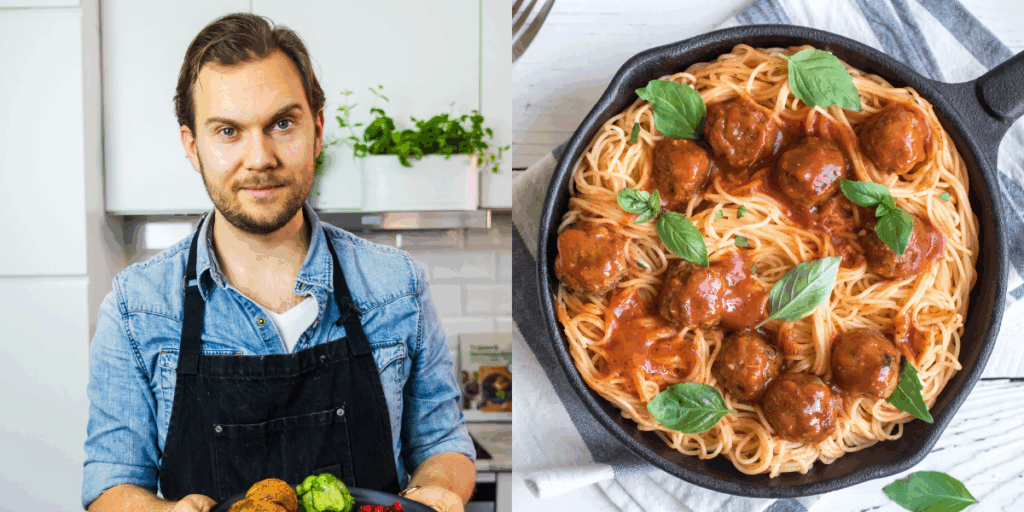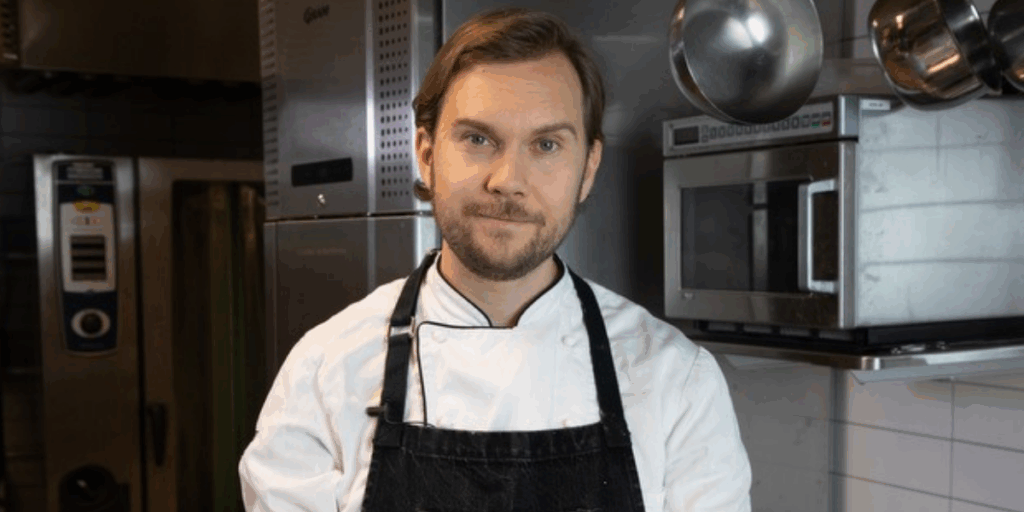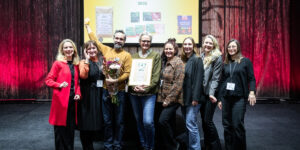

Gustav Johansson went from a curious home cook in Borlänge to Sweden’s plant-based culinary rebel – shaking up classic dishes with vegan flair. This fall at Nordic Organic Expo, he’s bringing his tasty revolution to the stage – proving sustainable eating can be both attainable and delicious.
Gustav Johansson didn’t set out to become one of Sweden’s most influential voices in plant-based food. Raised in the unassuming town of Borlänge, his teenage years were more about Taekwondo practice, political debates and the thrill of a new driver’s license than anything culinary. Food was just fuel back then – quick bites between training and late nights with friends. Still, the seeds of something bigger were quietly being planted.
– I was about as far as you could get from who I am today, he says with a laugh.
By his final year of high school, the routine of fast meals and parties had become second nature. But behind the scenes, a shift was brewing. Politically conscious and environmentally aware, Gustav already knew that eating less meat made sense for the planet. What surprised him was how personal the journey would become.
– I was a typical guy but I was also politically aware, so I knew eating vegetarian food was a good thing.
However, his first step toward vegetarianism wasn’t driven by activism but by aesthetics – a desire to lose weight. And it worked. He dropped 15 kilos. But what started as a practical decision soon transformed into something deeper. He began to feel disconnected from meat altogether.
– I initially became vegetarian to lose weight. Then I just started finding meat disgusting.
At the time, going vegan in Borlänge felt like a step too far. In 2006, it wasn’t just rare – it was radical. Grocery stores weren’t stocked with soy patties and oat milk and plant-based eating was seen as fringe at best. But Gustav’s curiosity kicked in. He started playing around in the kitchen, trying to recreate the comforting dishes he loved – but without the meat.

What began as a personal challenge soon turned into a full-blown creative outlet. In 2011, he launched Jävligt Gott – a blog where he documented his experiments with vegan versions of Swedish staples like meatballs, burgers and lasagna. The idea was simple: to show people that going plant-based didn’t mean giving up the food they grew up with.
– I wasn’t the only one who thought it sucked to only eat falafel and stir-fried veggies. It became a kind of cultural battle – should classic dishes be allowed to exist without meat?
As the blog grew, so did Gustav’s influence. By 2016, he was running it full time and two years later he embraced a fully vegan lifestyle – not because he had to, but because he was ready. The food world had evolved and now there were tools, ingredients and an audience that made the shift feel not just possible, but exciting.
However, 2016 was a year that brought both triumph and tragedy to Gustav’s life. Just as his platform hit new heights, his father – a key inspiration behind his love of flavours and food – passed away. In a bittersweet twist, the day before the funeral, Jävligt Gott was named Sweden’s best food blog.
– The timing was surreal. My dad had just passed away and at the same time, I got that recognition. It was the wildest thing that’s ever happened to me.
From that moment, things moved quickly. Cookbooks, TV appearances and even a spot in Sweden’s BBQ Championship (with vegan recipes, of course) followed. During the pandemic, Gustav launched ChouChou – a restaurant that would become the first in Sweden to serve 3D-printed plant-based meat. The concept was bold and ahead of its time.
– We didn’t plan to open during the pandemic but by late 2021, it was clear we had to. And by 2022, we were serving dishes no one else in Sweden had.
Still, the rollercoaster of entrepreneurship spared no one. A financial downturn forced ChouChou to close in early 2025. For many, that might’ve been a breaking point. But Gustav sees it differently – as part of the ride.
– I’m still going strong. Life as an entrepreneur is tough but it’s also incredibly fun. When it works, it’s the most rewarding thing – because I get to do something that really matters to me.

For Gustav, plant-based eating isn’t a trend or a purity test – it’s a lifestyle rooted in realism and compassion. He’s open about the fact that his partner and kids eat meat as his approach is less about labels and more about impact.
– I’m realistic that it’s not an easy or attainable lifestyle to fulfill. I’m vegan because it’s about what we need to do for the planet.
That grounded mindset has shaped his mission: to make sustainable eating easier for everyone. Gustav’s not here to shame anyone into giving up their favourite foods – instead, he wants to help people tweak them. Make better choices without sacrificing culture, taste or convenience.
– You don’t have to go all-in. The small choices matter. Honestly, just doing what you can is more important.
In recent years, Gustav’s noticed a shift. Plant-based eating may have lost its trendiness, but it’s also become less polarizing. The all-or-nothing mentality is fading and in its place is something more flexible – and more lasting.
– The way forward isn’t about glorifying vegans. It’s about helping people eat less meat – without making it feel like a big deal.
Gustav is even supportive of hybrid products that combine plant-based ingredients with meat – a controversial concept in some circles, but one he sees as practical progress.
– It’s not about making people give up their favourite foods. It’s about doing them differently. If a burger is 50% plant-based – that’s already a win.
As he heads to Nordic Organic Expo, Gustav isn’t just bringing recipes – he’s bringing a vision. One where food, climate goals and joy can all sit at the same table.
– I’m excited to show companies how to meet climate goals by rethinking how we eat. I can’t wait to connect with others who want to make this shift together.
By Rebecca Hyde-Price Aggestam


